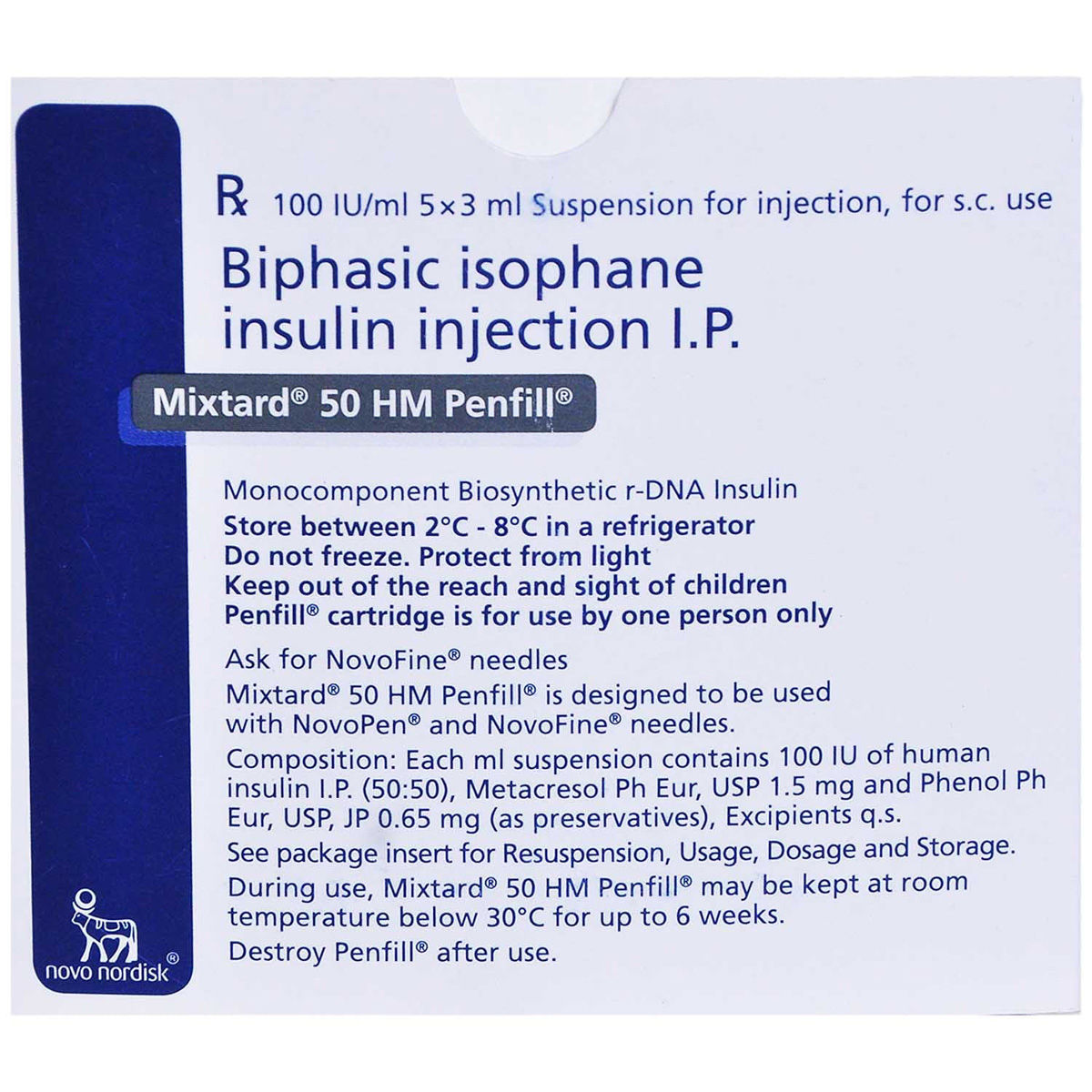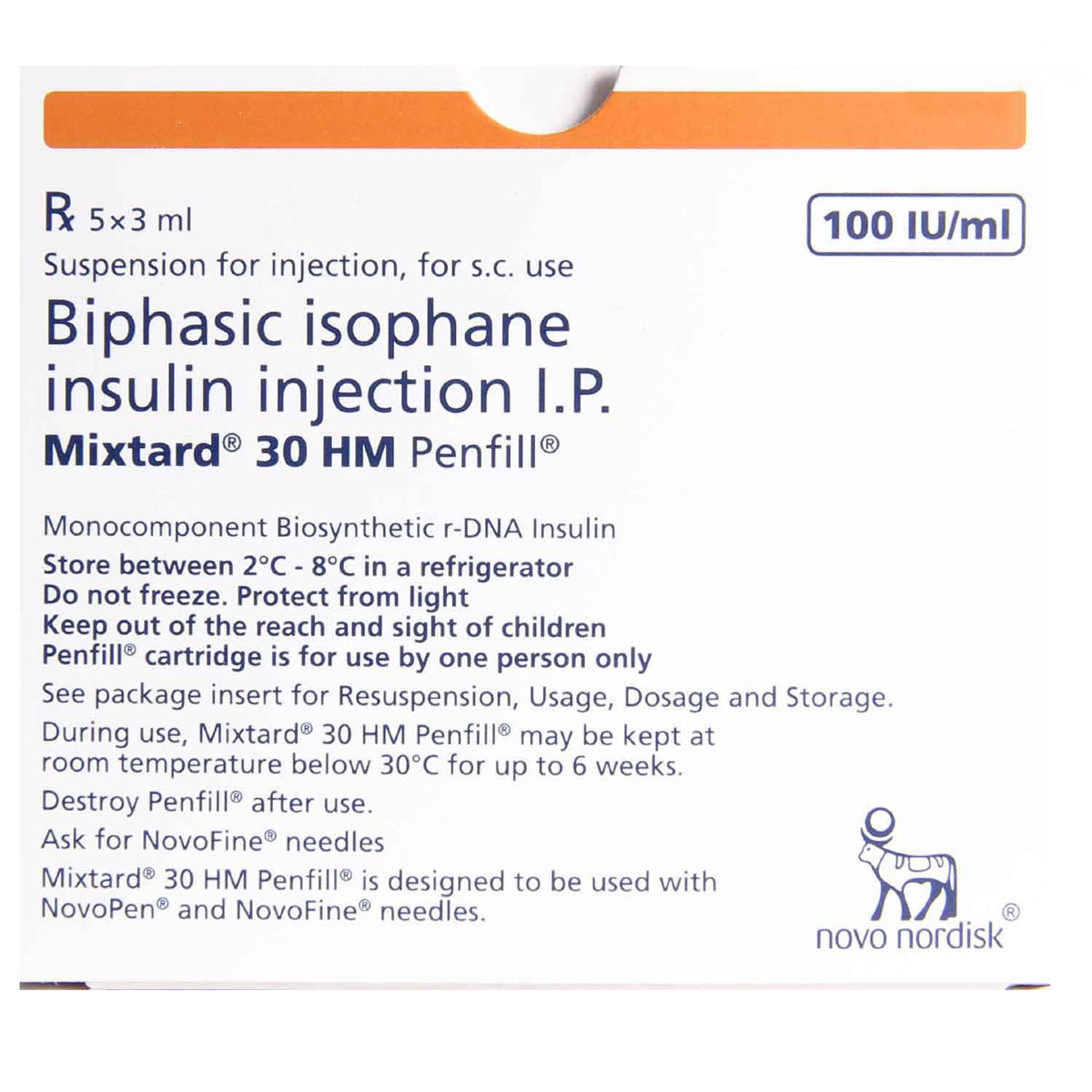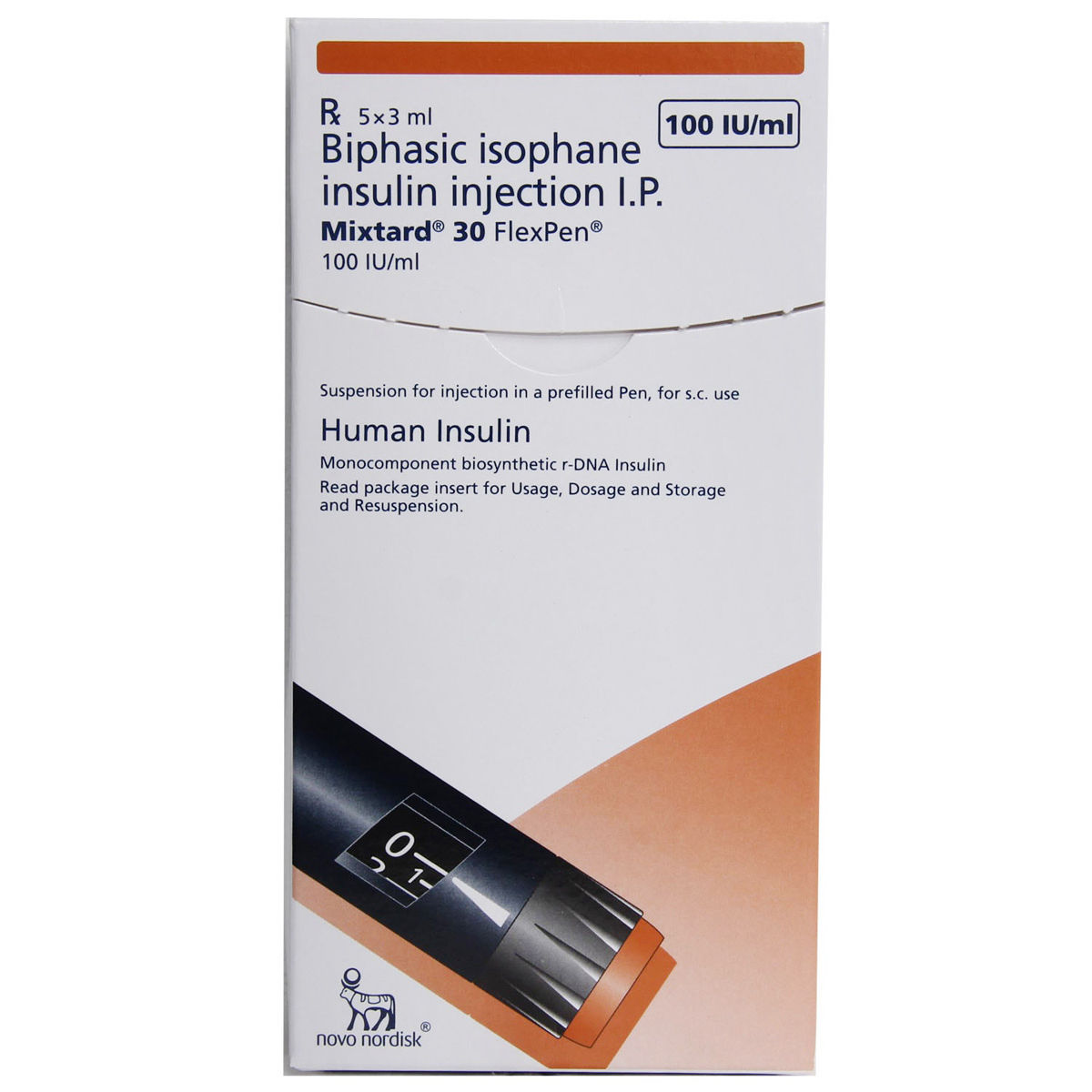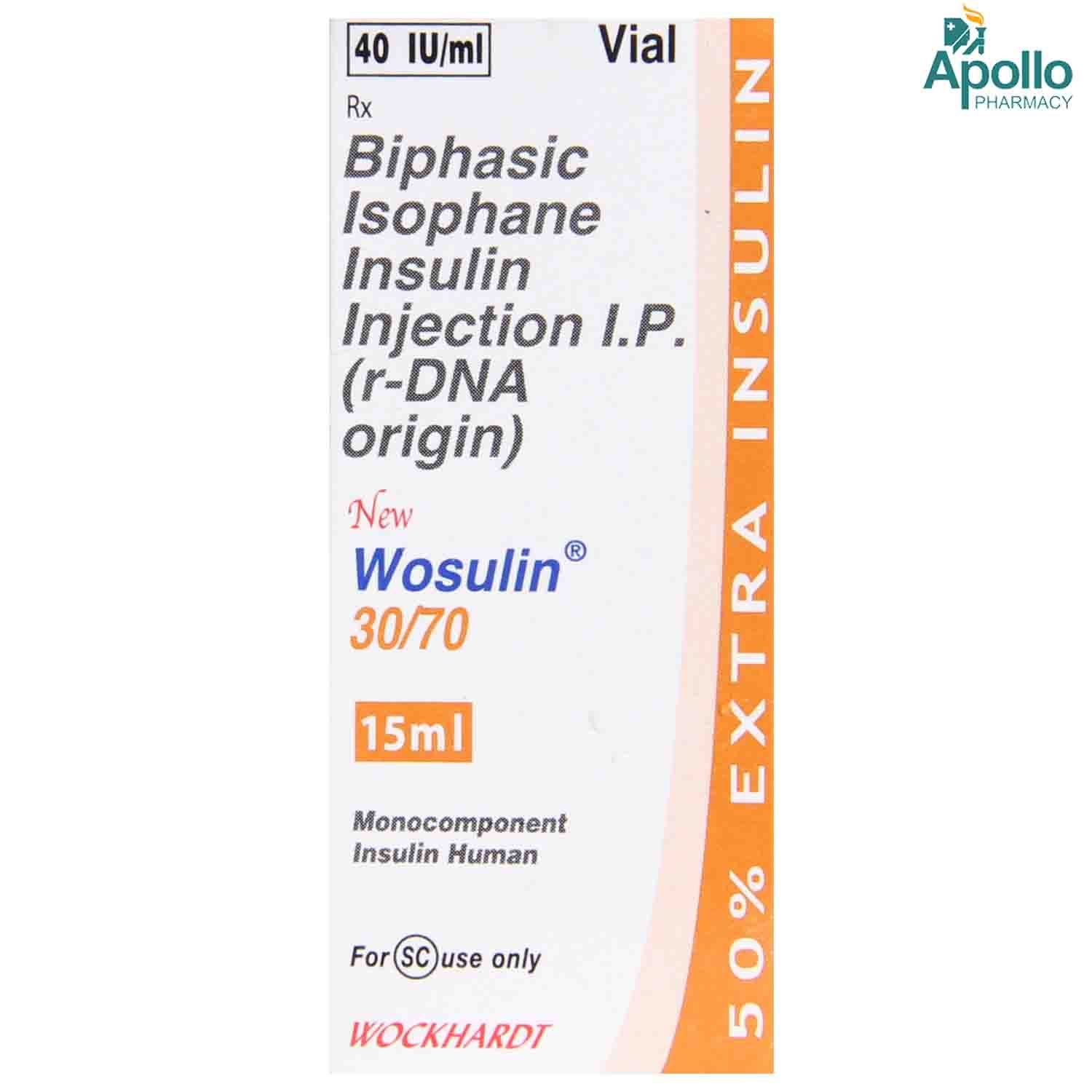Human Insulin+insulin Isophane
About Human Insulin+insulin Isophane
Human Insulin+insulin Isophane used for the treatment of both type 1 and type 2 diabetes mellitus. It maintains blood sugar levels in adults and children. In Type 1 Diabetes Mellitus, the body does not produce enough insulin to regulate blood sugar levels. In type 2 diabetes mellitus, either the body stops producing enough insulin (a hormone that helps lower blood sugar levels) or there is resistance to the action of insulin. As a result, insulin is produced in large quantities, but it is unable to function properly on the body's organs.
Human Insulin+insulin Isophane is a combination medicine that works by promoting the recovery of sugar in muscle and fat cells and suppressing sugar production in the liver. Together, Human Insulin+insulin Isophane confirms rapid and stable sugar control.
Not everyone who is taking Human Insulin+insulin Isophane will get these side effects. You may experience rash, injection site allergic reaction, weight gain, edema (tissue swelling or fluid overload), skin thickening at the injection site, low blood glucose levels, and itching. Most of these side effects of Human Insulin+insulin Isophane do not require medical attention and gradually resolve over time. However, if the side effects are persistent, reach out to your doctor.
Human Insulin+insulin Isophane should be taken as advised by your doctor. It should be administered subcutaneously (in the upper thigh, abdomen, upper arm, or buttocks) only. Your doctor will explain how to inject the medicine by your own. However, if it is difficult to inject the medicine, ask a healthcare professional to administer it. Along with Human Insulin+insulin Isophane, you should take a healthy diet, do regular exercise, and maintain weight as advised by your doctor.
Inform your doctor if you are allergic to Human Insulin+insulin Isophane. Do not take Human Insulin+insulin Isophane if you have any low blood glucose levels, kidney, liver, or heart problems, or problems with alcohol or other prescription or recreational drugs. Try not to stop receiving Human Insulin+insulin Isophane of your own. Let your doctor know about this, as it may cause withdrawal symptoms. Human Insulin+insulin Isophane is a cold chain medicine, and so it must be stored in the refrigerator between 2-8 degrees Celsius, or else its efficiency might get lost. Do not store in the freezer or the fridge.
Uses of Human Insulin+insulin Isophane
• Diabetes Management: Human Insulin+insulin Isophane is primarily used to regulate blood glucose levels in individuals with diabetes mellitus, helping to keep them within a healthy range.
• Postprandial Blood Sugar Control: Human Insulin+insulin Isophane effectively manages postprandial (after meal) blood sugar spikes through its combination of intermediate and short-acting insulin.
• Type 1 and Type 2 Diabetes Treatment: Human Insulin+insulin Isophane is prescribed for patients with Type 1 and Type 2 diabetes who are unable to achieve adequate glycemic control with oral hypoglycemic agents alone.
Medicinal Benefits
- Human Insulin+insulin Isophane is a combination medicine used for the treatment of both type 1 and type 2 diabetes mellitus.
- Human Insulin+insulin Isophane suppresses the production of sugar in the liver and facilitates the reuptake of sugar in the fat and muscle cells; thereby,
- This medicine ensures rapid and consistent sugar control in your body.
- Human Insulin+insulin Isophane helps in improving glycaemic control, which in turn decreases the risk of progression of diabetes like damage of the retina, damage to the kidney, damage to nerve cells, delayed wound healing, diabetic foot ulcer and others.
- The Penfill format facilitates precise and convenient dosing using an insulin pen device, thereby enhancing the ease of use for diabetic patients.
Directions for Use
• Follow your doctor's instructions on the dosage and timing of this medication, to ensure the safety. • Human Insulin+insulin Isophane should be administered subcutaneously (in the upper thigh, abdomen, upper arm, or buttocks). • It should never be administered intravenously or in the vein. • If you are not well trained to self-administer it, ask your healthcare professional to administer it.
Storage
Side Effects of Human Insulin+insulin Isophane
- Rashes
- Injection site allergic reaction
- Weight gain
- Swelling
- Skin thickening at the injection site
- Low blood glucose levels
- Itching
Drug Warnings
- Inform your doctor if you are allergic to Human Insulin+insulin Isophane.
- Do not take Human Insulin+insulin Isophane if you have any low blood glucose levels, kidney, liver, or heart problems, or problems with alcohol or other prescription or recreational drugs.
- Do not stop taking Human Insulin+insulin Isophane without consulting your doctor, as it may cause withdrawal symptoms.
- Human Insulin+insulin Isophane may decrease the level of potassium, leading to a state of hypokalemia that, if left untreated, may lead to respiratory paralysis, irregular heartbeat rhythm, coma, and even death.
- Human Insulin+insulin Isophane is for subcutaneous (under the skin) use only. If you are switching to a different insulin brand or using a different method of injection, it is recommended that you do so under strict medical supervision.
- Cases of heart failure have been reported when pioglitazone was used with insulin, especially in patients at high risk of cardiac heart failure.
- The first symptoms of hyperglycemia (high blood sugar levels) may include excessive thirst, dry mouth, increased frequency of urination, nausea, vomiting, drowsiness, flushed dry skin, loss of appetite, and an acetone odour in the breath. You should closely monitor these symptoms.
- It is advisable not to consume alcohol, as it may either increase or decrease your blood glucose level.
- Care should be taken while travelling across more than two time zones. Your doctor may adjust your insulin schedule.
- Human Insulin+insulin Isophane is a cold chain medicine, and therefore it must be stored in the refrigerator at a temperature between 2 °C and 8 °C; otherwise, its efficiency may be compromised. Do not store in the freezer or the fridge.
- Human Insulin+insulin Isophane should not be administered intravenously (into the vein).
Drug Interactions
Drug-Drug Interaction: Human Insulin+insulin Isophane may interact with medicines such as pain killer (aspirin), antibiotic (ciprofloxacin), bronchodilators (albuterol, ipratropium), diuretic (furosemide), anti-hypertensive (metoprolol), anti-depressant (sertraline), oral hypoglycemic agents, monoamine oxidase inhibitors, anabolic steroids, glucocorticoids, thyroid hormones and sympathomimetics.
Drug-Food Interaction: Avoid consumption of alcohol along with Human Insulin+insulin Isophane as it may lead to unpleasant side effects.
Drug-Disease Interaction: Inform your doctor if you have kidney disease, liver disease, low potassium level (hypokalaemia), and low blood sugar/glucose level (hypoglycemia).
Drug-Drug Interactions Checker List:
Safety Advice

Alcohol
unsafeYou are recommended not to consume alcohol along with Human Insulin+insulin Isophane to avoid unpleasant side effects. Alcohol may cause increased drowsiness.

Pregnancy
consult your doctorIt is safe to use Human Insulin+insulin Isophane during pregnancy if prescribed by the doctor. However, consult your doctor if you have any concerns regarding this.

Breast Feeding
consult your doctorIt is safe to use Human Insulin+insulin Isophane by breastfeeding mothers if prescribed by the doctor. However, consult your doctor if you have any concerns regarding this.

Driving
cautionHuman Insulin+insulin Isophane may cause drowsiness and hypoglycemia (low blood sugar). Therefore, drive only if you are alert.

Liver
cautionHuman Insulin+insulin Isophane should be taken with caution, especially if you have a history of liver disease. The dose may have to be adjusted by your doctor.

Kidney
cautionHuman Insulin+insulin Isophane should be taken with caution, especially if you have a history of kidney disease. The dose may have to be adjusted by your doctor.

Children
safe if prescribedHuman Insulin+insulin Isophane can be given safely to children provided the dose has been prescribed by a child specialist.
Habit Forming
Diet & Lifestyle Advise
- Include foods rich in healthy carbohydrates and fiber, fruits, whole grains, and vegetables in your diet.
- Try eating food at regular intervals. Do not skip meals. Also, try not to overeat.
- Follow a healthy diet and walk for at least a few minutes to complement treatment with Human Insulin+insulin Isophane.
- Maintain a healthy weight by exercising regularly.
- Rest properly, and avoid stress by doing meditation or yoga.
Special Advise
If you feel any symptoms of hypoglycemia (fatigue, dizziness, confusion, heart palpitations, shakiness and anxiety), consult your doctor immediately.
Patients Concern
Disease/Condition Glossary
Diabetes: Diabetes is a chronic or lifelong disease that prevents the body from utilizing insulin properly. Insulin is the hormone that controls sugar levels in the blood. Diabetes is a condition in which blood glucose levels are above normal. It is of two types: type-1 and type-2 diabetes. Type-1 diabetes is a condition in which the pancreas produces little or no insulin. Type-2 diabetes affects the way body processes the sugar. Symptoms of diabetes include lack of energy, tiredness, frequent urination, excess thirst, dry mouth, blurry vision, constant hunger, weight loss, and itchy skin.
FAQs
Human Insulin+insulin Isophane is used for the treatment of‚ both type 1 and type 2 diabetes mellitus.
Human Insulin+insulin Isophane suppresses the production of sugar in the liver and‚ facilitates the reuptake of sugar in the fat and muscle cells, thereby Human Insulin+insulin Isophane ensures rapid and consistent sugar control.
Human Insulin+insulin Isophane may sometimes lower the blood glucose levels more than normal, leading to hypoglycaemia. Regularly monitor your blood sugar levels while taking Human Insulin+insulin Isophane. Hypoglycaemia symptoms include headache, drowsiness, cold sweat, feeling sick, unusual tiredness or weakness, and visual disturbances.
Do not stop taking Human Insulin+insulin Isophane without consulting your doctor on your own as it may cause an increase in blood glucose levels. Continue taking Human Insulin+insulin Isophane for as long as your doctor has prescribed it to you. Do not be reluctant to speak with your doctor if you experience any difficulty while taking Human Insulin+insulin Isophane.
Maintain a healthy diet by regular intake of carbohydrates such as bread and products containing starch and sugar. Eat your meals regularly, and do not exercise heavily for longer durations with an empty stomach.
Hypoglycaemia may occur following prolonged or severe exercise, during illness, alcohol consumption, low food intake, or when Human Insulin+insulin Isophane is taken along with other antidiabetic medicines.
Side effects of Human Insulin+insulin Isophane include allergic reaction at the site of injection, hypoglycemia (low blood glucose level), itching, lipodystrophy (skin thickening or pits at the injection site), oedema (swelling), rashes, and weight gain. Most of these side effects may not require medical attention and gradually resolve over time. However, if the side effects are persistent, reach out to your doctor.
Cut back on foods high in sodium, alcohol, fried foods, and high-carb food and drinks like sugary drinks, drinks with added sugar, white rice and starchy vegetables.
The injection site should be changed to prevent skin changes like lumps under the skin. Human Insulin+insulin Isophane may not work well if injected into the lumpy area.
Maintain a healthy diet and exercise regularly. Limit sugar intake and avoid smoking & alcohol consumption. Manage stress by doing meditation or yoga.
Hypoglycaemia (low blood sugar) may occur because you inject too much insulin, miss or delay meals, do not eat enough, eat food containing less carbohydrate than normal, drink alcohol, lose carbohydrates due to vomiting or diarrhoea, do more exercise than usual or a different type of physical activity, are recovering from an injury, illness, operation or stress, or are taking/have stopped taking other medicines.
Symptoms of high blood sugar include feeling thirsty, increased urination, weakness or tiredness, blurred vision and weight loss.
Human Insulin+insulin Isophane is to be injected below the skin (subcutaneously). The best areas to inject Human Insulin+insulin Isophane are on your stomach, upper arm, upper thigh, or buttocks.
Unopened vials are to be refrigerated between 2°C and 8°C. Opened vials (in-use) may be stored not above 25ºC for a maximum of 4 weeks. The used needle should be placed in a puncture-resistant disposable container and disposed of properly as directed by your healthcare provider.
Avoid drinking alcohol while taking Human Insulin+insulin Isophane as it might lower blood sugar levels and cause hypoglycaemia.









